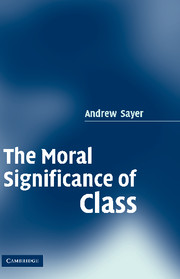Book contents
- Frontmatter
- Contents
- Preface and acknowledgements
- 1 Introduction
- 2 From the habitus to ethical dispositions
- 3 Recognition and distribution
- 4 Concepts of class: clearing the ground
- 5 Struggles of the social field
- 6 Moral and immoral sentiments and class
- 7 Responses to class I: egalitarianism, respect(ability), class pride and moral boundary drawing
- 8 Responses to class II: explanations, justifications and embarrassment
- 9 Conclusions and implications
- Bibliography
- Index
9 - Conclusions and implications
Published online by Cambridge University Press: 22 September 2009
- Frontmatter
- Contents
- Preface and acknowledgements
- 1 Introduction
- 2 From the habitus to ethical dispositions
- 3 Recognition and distribution
- 4 Concepts of class: clearing the ground
- 5 Struggles of the social field
- 6 Moral and immoral sentiments and class
- 7 Responses to class I: egalitarianism, respect(ability), class pride and moral boundary drawing
- 8 Responses to class II: explanations, justifications and embarrassment
- 9 Conclusions and implications
- Bibliography
- Index
Summary
There are two types of conclusions and implications that I want to discuss. The first concern theoretical and philosophical matters, particularly about valuation, values and the relationship between positive and normative thought. This is warranted because both the subject matter and the approach that I have taken to it have been somewhat unorthodox. I have sought to understand lay normativity in relation to class, attempting to take it seriously and appreciate its internal force, instead of ignoring it or reducing it to a correlate of social position or discursive construction. While it has been a primarily positive analysis of lay normativity, at times it has itself been more openly normative about that subject matter than is usual in social science, and I will add further normative judgements in this last chapter. In the first part I therefore want both to defend the approach to normativity that I have taken and to suggest how normative evaluations such as those I have made might be justified. This involves challenging common views about the assumed ‘subjective’ nature of valuation, the distinction between positive and normative discourse and the relation between them, and the kinds of grounds that we might appeal to when justifying normative judgements. On all these matters I owe the reader some explanations.
In the second part I address more substantive matters and restate the case for understanding the moral significance of class.
- Type
- Chapter
- Information
- The Moral Significance of Class , pp. 213 - 232Publisher: Cambridge University PressPrint publication year: 2005



